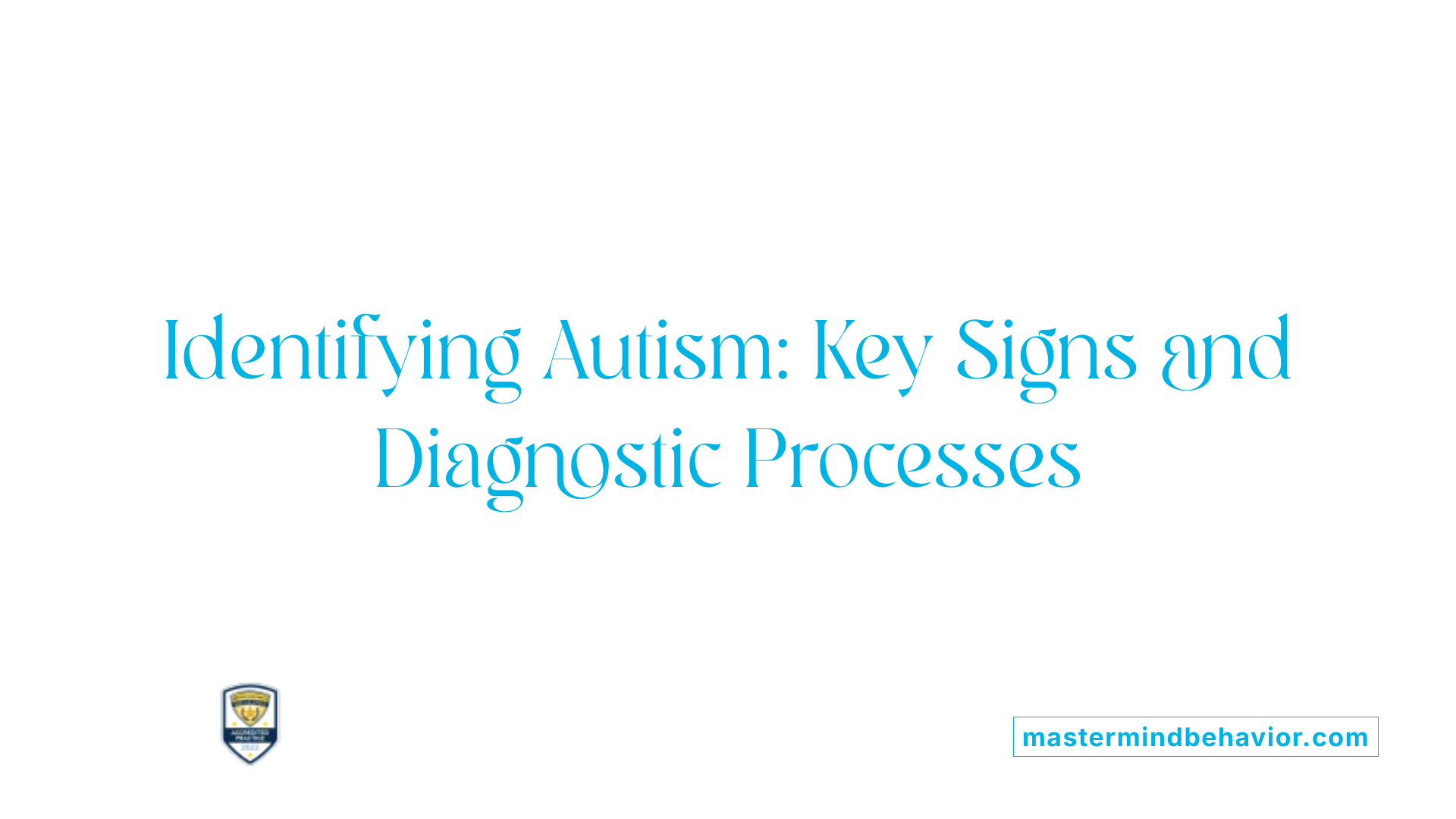Benefits of early support from an Aba Therapist is key
Benefits of early support from an Aba Therapist is key
Blog Article
Understanding the Effect of Behavioral Autism on Life and Social Interactions
You might not realize exactly how deeply behavioral autism impacts every day life and social interactions. People on the spectrum often browse a world loaded with interaction difficulties and sensory overload. These difficulties can result in irritation and seclusion, affecting their partnerships and total well-being. Recognizing these subtleties is necessary for promoting helpful environments. What strategies can we execute to produce more purposeful connections and inclusive areas? The responses could stun you.
Defining Behavior Autism and Its Characteristics
Behavior autism, typically described as autism range disorder (ASD), includes a range of problems characterized by difficulties in social interaction, interaction, and repetitive habits. You could discover that people with ASD commonly struggle to analyze social signs, which can cause misconceptions in conversations. They may find it hard to establish eye get in touch with or participate in tiny talk, making social scenarios feel frustrating.
Communication difficulties can show up in different methods, from postponed speech growth to a preference for utilizing less words. Recurring behaviors, such as hand-flapping or shaking, can function as coping systems to take care of anxiety or sensory overload. These characteristics can profoundly influence every day life, making it important for you to recognize and support those with ASD. By recognizing these attributes, you can cultivate an environment that promotes acceptance and motivates efficient interaction, aiding people with autism grow in their daily interactions.
The Spectrum of Autism: Comprehending Irregularity in Habits
Autism range problem (ASD) isn't a one-size-fits-all medical diagnosis; it varies commonly amongst people. You may see that some people with ASD exhibit light signs and symptoms, while others might encounter a lot more considerable difficulties. This irregularity can materialize in habits, rate of interests, and sensory level of sensitivities. You might come across individuals that are highly spoken and engage conveniently in discussions, while others may choose singular activities or interact non-verbally.
Furthermore, the way people with ASD react to sensory input can differ significantly; some could be bewildered by brilliant lights or loud noises, whereas others flourish in stimulating settings. The range additionally includes differences in social communications; some individuals might have a hard time to interpret social hints, while others navigate social setups with relative ease. Comprehending this irregularity is crucial, as it assists you appreciate each individual's unique experience and dressmaker assistance to their certain needs, promoting a more inclusive environment for everyone.
Communication Challenges Encountered by People With Autism
When you engage with people on the autism spectrum, you might see their one-of-a-kind communication challenges. They frequently encounter difficulties with both verbal and nonverbal cues, which can influence their social communications. Comprehending these barriers is essential for fostering much better links and assistance.

Verbal Interaction Problems
Several people on the autism range experience verbal interaction difficulties that can considerably influence their day-to-day interactions. Your rate, tone, or quantity could not line up with social expectations, creating others to misinterpret your intentions. Identifying these difficulties can help you and your assistance network develop approaches to enhance communication and cultivate better connections with others in your daily life.
Nonverbal Interaction Barriers
Spoken interaction isn't the only difficulty individuals on the autism spectrum face; nonverbal interaction obstacles can be simply as significant. You might find it difficult to interpret body movement, facial expressions, and eye get in touch with, which are essential for effective interaction. These challenges can bring about misunderstandings or misinterpretations of social hints, making communications really feel confusing or frustrating. You might have a hard time to share your own emotions with nonverbal methods, leaving others uncertain of your sensations or intentions. This separate can create feelings of seclusion and irritation. Recognizing these barriers is vital for cultivating understanding and empathy in your interactions. By attending to nonverbal interaction, you can locate strategies to enhance your social experiences and boost your total quality of life.
Social Interaction Effects
Social communications can often feel overwhelming due to the unique communication obstacles encountered by people with autism. You could fight with translating social hints, making it tough to understand sarcasm or body language. This can bring about misconceptions or awkward minutes in discussions. Furthermore, starting and maintaining conversations might really feel difficult, causing stress and anxiety in social scenarios. You might prefer organized settings, making spontaneous interactions unpleasant. It's also usual to experience trouble in involving in little talk, which can impede developing new friendships. Acknowledging these difficulties can help you locate approaches to enhance communication, such as exercising social skills in secure settings or making use of visual aids - Autism Therapist. Recognizing your needs permits you to browse social interactions with better confidence and convenience.
Social Communication and Partnership Building in Autism
While building partnerships can be challenging for individuals with autism, recognizing their distinct point of views and interaction styles can promote significant links. You may observe that several individuals on the range prefer straight interaction and may battle with social hints or tiny talk. By being straightforward in your interactions, you can aid develop an environment where they feel comfortable.
Make the effort to pay attention and observe exactly how they express themselves. This insight can direct you in steering conversations extra effectively. Taking part in shared interests can likewise act as a bridge to much deeper links. Whether it's a pastime, a favored program, or a common interest, these usual threads can open doors to friendship.
Life Routine: Navigating Difficulties and Methods
Navigating day-to-day life routines can be particularly challenging for people with autism, particularly when unforeseen modifications occur. You might locate convenience in having a structured schedule, as it aids you anticipate what's next. When disruptions take place, it's regular to really feel nervous or overloaded. To browse these difficulties, consider implementing aesthetic routines or lists. These devices can give quality and reassurance.
Developing a routine that consists of sensory breaks can also be useful. You can intend time-outs throughout your day to recharge. It's vital to interact with those around you, letting them recognize your requirements and choices. This aids create an understanding atmosphere.
Last but not least, method mindfulness strategies to manage tension and anxiousness. Easy breathing exercises or grounding methods can make a substantial distinction. By incorporating these strategies, you can boost your daily regimen and minimize disruptions, more info making life feel much more convenient.
Toughness and Abilities of Individuals on the Autism Spectrum
Comprehending every day life regimens is just one aspect of the autism experience. Lots of people on the autism spectrum possess remarkable staminas and capabilities that establish them apart. You could locate that your interest to information is remarkable, permitting you to master tasks that need accuracy and focus. Your capability to think outside the box can cause cutting-edge solutions in various situations.
Moreover, your memory abilities frequently radiate, particularly in locations of interest. Aba Therapist Near Me. This knack for keeping information can make you a valuable source in fields like science, modern technology, or art. You might additionally display strong aesthetic reasoning, enabling you to visualize complex ideas and fix troubles artistically
In addition, your one-of-a-kind perspective on the globe can promote compassion and understanding in others, enriching social interactions. Welcoming these toughness not only improves your self-confidence yet also assists others appreciate the diverse talents you bring to the table.
Developing Comprehensive Atmospheres for Individuals With Autism
Creating comprehensive environments for individuals with autism starts with making sensory-friendly spaces that satisfy their special demands. You can also promote possibilities for social communication, helping to build friendships and links. By making these adjustments, you'll add to an extra welcoming environment for everybody.
Creating Sensory-Friendly Spaces
While designing sensory-friendly spaces, it's crucial to show on the one-of-a-kind demands of people with autism. Incorporate peaceful areas where individuals can pull back and charge when bewildered. Include aesthetic routines or clear signs to help people navigate the room with confidence.
Advertising Social Communication Opportunities
Creating sensory-friendly rooms not only addresses specific comfort however also sets the stage for significant social interactions among people with autism. Motivate peer mentoring, combining individuals with autism with encouraging peers who can assist them via social scenarios. By applying these methods, you can improve social chances, aiding individuals with autism build relationships and strengthen their social abilities in a risk-free, welcoming environment.

Frequently Asked Questions
Just How Can Pals Assistance Someone With Behavioral Autism?
You can support a friend with behavior autism by being client, paying attention actively, and valuing their boundaries. Take part in activities they delight in, communicate honestly, and create a comfortable atmosphere where they really feel valued and comprehended.
What Resources Are Available for Moms And Dads of Kid With Autism?
You can check out numerous resources for parents of youngsters with autism, consisting of support teams, educational sites, and regional area services. Getting in touch with other moms and dads can likewise provide valuable insights and shared experiences to aid browse challenges.
Can Behavioral Autism Adjustment In Time?

Yes, behavioral autism can transform in time. You may see changes in interaction, social abilities, and behavior as your child expands. Early treatment and support often play crucial roles in these developmental changes.
Just How Do Sensory Sensitivities Influence Daily Life?
Sensory sensitivities can make everyday experiences frustrating. You may have problem with loud noises or intense lights, bring about tension or avoidance. Discovering settings that fit your requirements can considerably improve your convenience and total life.
What Prevail Misconceptions Concerning Behavioral Autism?
You could believe behavioral autism only affects communication abilities, however it's even more complicated. Numerous presume people lack empathy or intelligence, which isn't real. Understanding these mistaken beliefs aids foster acceptance and support for those on the range.
Behavior autism, typically referred to as autism spectrum condition (ASD), incorporates an array of problems identified by challenges in social communication, communication, and repetitive habits.Social interactions can frequently feel overwhelming due to the unique communication obstacles dealt with by people with autism.Designing sensory-friendly spaces not only addresses private comfort but likewise establishes the phase for meaningful social communications amongst people with autism. Encourage peer mentoring, combining people with autism with encouraging peers who can assist them through social situations. By carrying out these methods, you can enhance social opportunities, assisting individuals with autism develop relationships and enhance their social skills in a safe, inviting setting.
Report this page